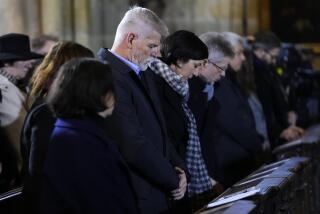In Czechoslovakia, the ‘Velvet Revolution’ Settles In : Prague: Czechs and Slavs talk about not having show trials or seeking scapegoats; reconciliation, not revenge, is the urgent need.
- Share via
PRAGUE, CZECHOSLOVAKIA — A few days ago I met with my old friend from high school, Vaclav Havel. He, like many others in Czechoslovakia, had changed jobs so often over the last 20 years--and in such a bizarre fashion--that only with a communist education could you be properly prepared. From a student to a playwright, from a playwright to a dissident, from a dissident to a brewery worker, from a brewery worker to a prisoner and from a prisoner to a candidate for the presidency of Czechoslovakia. It was late at night. Havel was tired but happy. “Do you know the nickname of our revolution?” he asked: The “Velvet Revolution.”
The next morning, walking on Wenceslas Square, I understood what he meant. A few days before on French television in Paris I saw the human avalanche sweeping the same square. Three hundred-thousand people filled every square inch of it. And today I am walking there, amazed that not even the tiniest branch of the many young linden trees is broken.
I look around and see millions of slogans but they are not sprayed onto the walls. They are written on scraps of paper and carefully taped to the buildings. Underneath the slogans, Prague’s marble is still clean. Except in one place: Next to the Communist Party headquarters in a park named after him is a marble statue of Klement Gottwald, the first communist ruler of the country. The whole statue is snowy white except for the hands. Gottwald’s fingers are bloody red and the paint is still dripping.
What an irony that the former president, Gustav Husak, didn’t even muster enough decency to apologize to millions of his countrymen for the suffering that the last 20 years of communist rule had brought upon them.
It is a tragedy no communist rulers of Czechoslovakia seem to understand, that their arrogance in denying an apology to the people is today the main reason for a burning question: Who is going to pay for this degradation of the human spirit?
Will it be the informer who overheard a tipsy citizen in a local pub uttering some derogatory remarks and called his boss in the secret police, who then ordered his uniformed counterpart to arrange the arrest? Or will it be the two lowly cops ordered to perform the actual arrest? Will it be the interrogator who might have used physical persuasion to extract a confession or will it be the judge who sentenced this citizen to two years in jail?
Havel hopes it will be none of them.
After all, in those times, these people were just obeying existing laws. Their actions were, literally speaking, “legal.”
All this leads Czech citizens to a question: Are we capable of rising above “tit for tat” and, as at Nuremberg in 1946, put on trial just a perverted philosophy and those few individuals responsible for its implementation? Should only those rulers who imposed laws clearly contradicting standards of human dignity be called for judgment?
Civic Forum members, the opposition, believe yes. They believe Czechs and Slovaks are mature enough to break the chain of hatred and revenge. They talk about the possibility of national reconciliation in a democratic society. But they say they wish they weren’t alone in this effort. They believe that it is necessary to create a new international forum in the near future to examine cases like theirs.
The world has witnessed too much abuse of power in this century. The family of nations should abide by decisions from the International Court of Justice, empowered to interrogate those governments suspected of imposing on their citizens laws that violate basic standards of human decency. Only then will the wasted lives of millions be at least partially redeemed and many future human tragedies avoided.
Meanwhile, on the streets, thousands of citizens in Czechoslovakia not affiliated with any political party are signing petitions asking that the Czechoslovak Communist Party take back its two expelled leaders, Milos Jakes and Miroslav Stepan, because they don’t want to have them as equals.
Well, Kafka is obviously alive and well in Prague these days.
More to Read
Sign up for Essential California
The most important California stories and recommendations in your inbox every morning.
You may occasionally receive promotional content from the Los Angeles Times.













